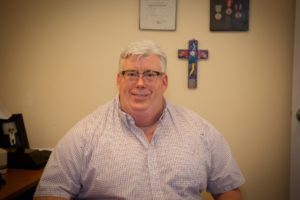Ethnography Summary
Wen-Cong Toh interviewed George Lowe, The Director of Resident Services at The Center in Asbury Park.
The Center in Asbury Park is a volunteer based New Jersey not-for-profit service organization, providing support services for people living with HIV/AIDS and their caregivers. They have nutritional programs as well as housing programs like Center House, which houses 25 permanent residents with HIV, many of whom are formerly incarcerated.
Date: 3/7/15
Type: Expert Interview
Location: Phone Call
Team participants: Conducted interview alone

User Characteristics:
He is a gay white male in his 50’s and 60’s, and is responsible for Center House (residential arm of the organization) and their emergency placement program for homeless individuals.
What is this person about – what drives him/her? He is very driven to help the HIV-infected population. He ran community health centers in New York City. He is still working in healthcare, just with a homeless population now.
What is this person’s biggest point of pain? Not having enough funding to support all of their clients, clients being overly concerned about social stigmas, navigating the unique intersecting health (HIV and mental), housing, and incarceration issues for each resident.
Memorable quotes from interview:
“Housing is Healthcare.”
“If you have a felony, a lot of people won’t rent to you, if you have been convicted of the distribution or manufacturing of drugs, you can’t get any benefits through social service. Employers won’t hire you. We want to keep them in care but that’s impossible if they’re not housed properly. It is not fair; a felony can be just contempt of the court. Upon release, they are not supposed to be discriminated against, but they are.”
“It is difficult to get apartment owner/landlords to accept these people because they’re often undesirables of community, who do come with a relatively high level of risk.”
“The law creates the stigma, both against the HIV population and ex-convicts. With the HIV population, if they are asymptomatic (through medication) and use condoms, there is a zero percent chance of transmitting the infection, so they feel like they shouldn’t have to disclose (to sexual partners).”
“The biggest barrier is within the community with rent, we must pay market price to house our clients.”
Top 3 Learnings:
- There are actually a lot of grants that non-profits can apply for to help this specific population as people are worried about the potential outbreak of HIV. When housing clients in motels/apartments, the center pays for all rent and amenities. The center takes responsibility for their clients if anything goes wrong, so the program is set up to be safer and profitable for the landlords.
- Mental health is another major issue; many clients grow to feel that they don’t deserve employment or housing and are very concerned about the stigma around both being incarcerated and having HIV. They develop conditions like depression and bipolar disorder. Suicidal clients are especially common when they first enter the cycle of drug abuse/incarceration and homelessness/re-incarceration.
- The center does have pretty strict rules for their residents. While letting in most ex-felons, they don’t house major sex offenders and they have strict rules against using drugs while living in the center. Clients with substance abuse issues must stick to a treatment plan set out by their counselor.
Key Insight – (1) Imani Unidad can apply for federal grants to start up a housing program for their clients with HIV, or just obtain funds to help clients pay for emergency housing and amenities. This would make landlords in the area much more receptive to the idea of accepting formerly incarcerated individuals, many of whom probably have very low incomes as well. (2) There should be more emphasis placed on treating the mental health issues among this population, as that may be a root cause to why so many struggle to find housing or employment. If they don’t have the self-confidence or mental stability to represent and stand up for themselves well, it makes it easier for the community to marginalize them
Activities:
- Plans, directs and coordinates activities necessary to centralize case management across multiple agencies with multiple disciplines
- Applies for grants
- Determines the best use of funding to help the most individuals
- Negotiates with landlords and apartment complexes in their area to accept their clients as tenants
- Determines where to place the homeless clients in their emergency housing program
- Leads the process for new residents to move into Center House
- Ensuring that the medical and physical (food/shelter) needs of their clients are met.
Environment
- Asbury Park, Monmouth County, NJ
- A wealthy, generally liberal town, located on the Jersey Shore
- Can be very depressing and seem hopeless at times. A recent client committed suicide recently before they could house him at Center House.
- The Center has been described as: friendly, helpful, and informed but nonjudgmental.
Interactions:
- Helping clients infected with HIV (Both residents and nonresidents).
- Many of these individuals also have been incarcerated, homeless, and/or drug abusers.
- Appealing to federal and state officials for funding, especially those from the CDC and State Department of Health.
- Other non-profit organizations (such as those that focus on the homeless)
- Educating community leaders and business owners
- Directing their employees at The Center in Asbury Park.
Objects:
- The Center
- Transportation
- Shelter
- Computer and phone
Users:
- Clients (residents and nonresidents) with HIV
- HIV-infected individual who is homeless/formerly incarcerated.
- People in the community
- Government officials.